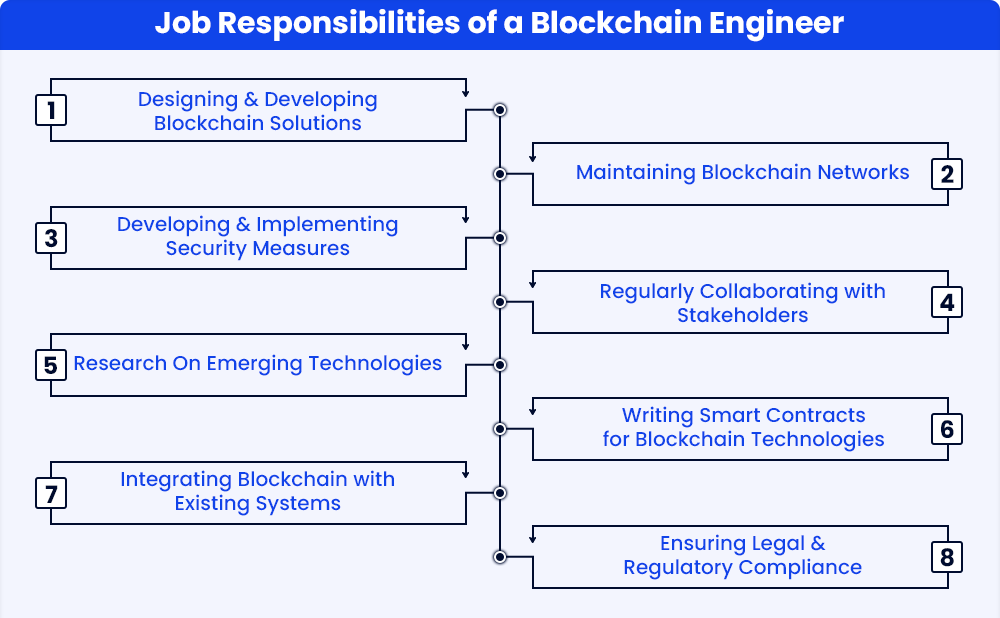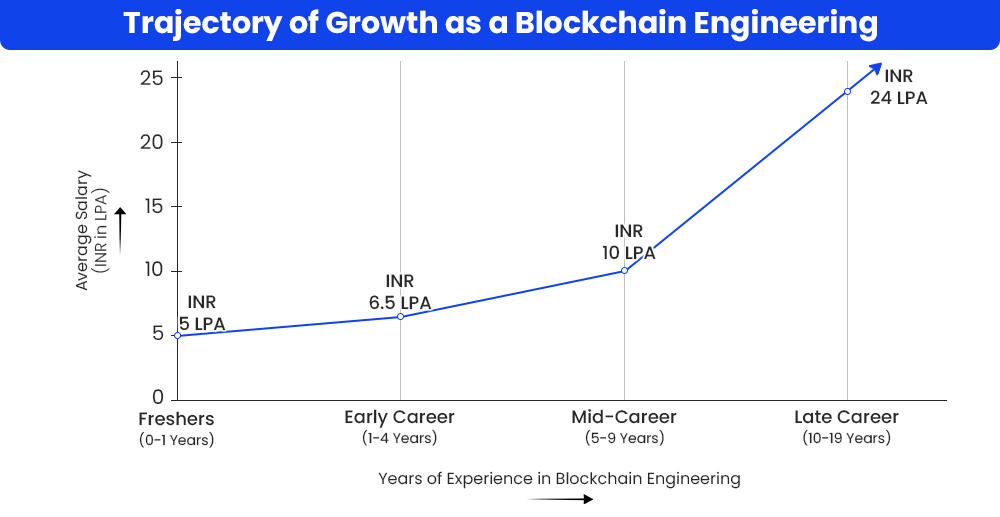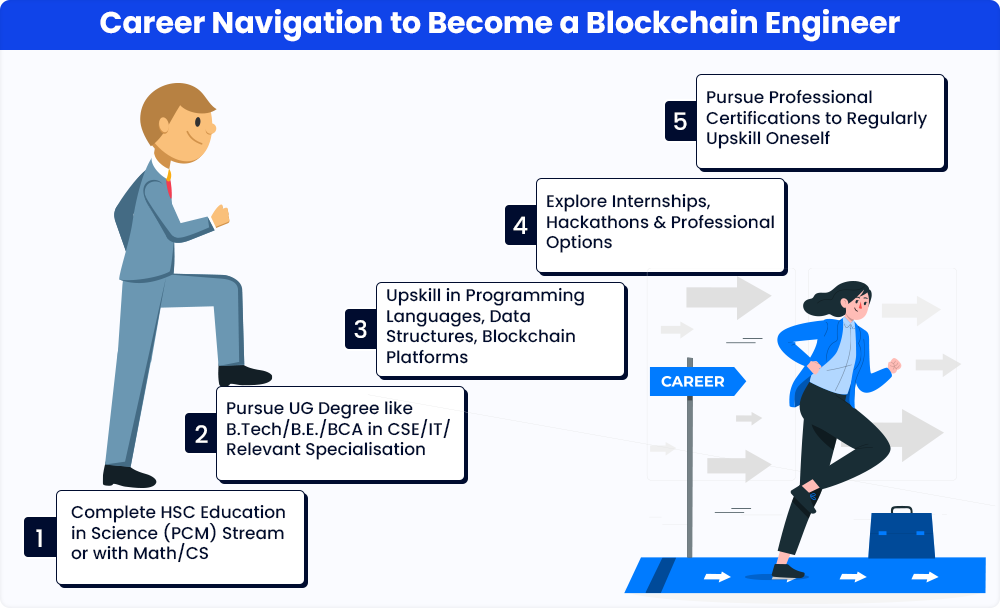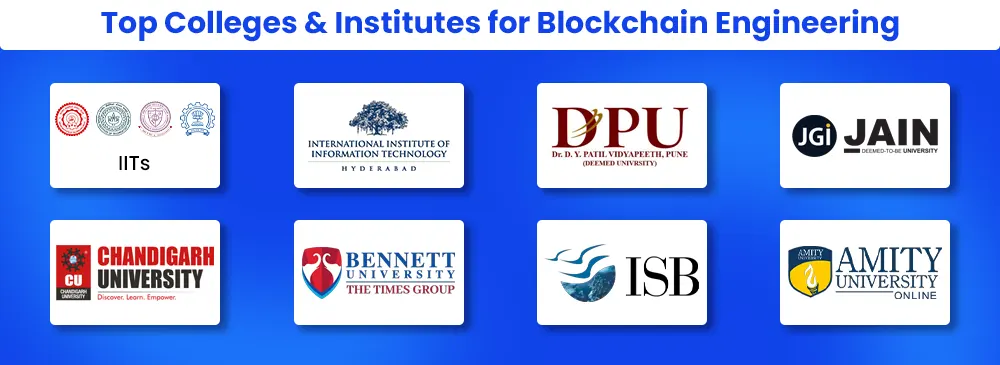Expert Interviews
- University Reviews
- Career Guide
 Video Counseling
Video CounselingImportant Facts
- Ask any Question - CV Forum

How to Start a Career in Blockchain Technology | Beginner's Guide 2026
College Vidya Team Jan 23, 2026 1.1K Reads

With rapid technological advancements marking the industrial landscape, a large number of organisations are now investing in blockchain technologies. As a result, careers in blockchain engineering are growing in demand and becoming lucrative by the hour.
If you are a technology enthusiast who is looking to venture in the career of blockchain engineering, then this blog will give you a step by step walkthrough of navigating the journey.
Why Choose a Career in Blockchain Engineering?
Whilst a majority of technology careers are lucrative, blockchain technology offers certain novel advantages which make it an option worth considering. Below are a few such reasons to consider a career in blockchain engineering.
- Demand Across Industries: There are a number of prominent and well-paid industries in which the demand for blockchain engineers is on the rise, such as the BFSI sector, supply chain sector, healthcare sector, cybersecurity sector and so on.
- Competitive Compensation Offered: The compensation offered to blockchain developers is quite lucrative, with entry-level roles starting with packages in the range of INR 6-10 LPA. With further years of experience, this metric grows significantly to provide a robust financial future to the professional.
- Innovative Career Domain: Be it decentralised application development, smart contracts, NFTs or web 3.0, blockchain engineers get the chance to very closely contribute to cutting-edge technologies and integrate their software with such emerging and innovative technological developments.
- Diverse Specialisation Options: There are a number of niche domains that blockchain engineers can further specialise in, including those like blockchain quality assurance, blockchain development, blockchain project management, and so on. All of these niches are well-compensated fields in blockchain technology.
- Growing Scope with Emerging Technologies: As blockchain is getting increasingly integrated with technologies such as Artificial Intelligence (AI), IoT, big data, and so on, it is growing further in scope and applicability, creating a strong tech ecosystem.
Roles & Responsibilities of a Blockchain Engineer
The job role of a blockchain developer is quite dynamic and vast, with a multitude of responsibilities that call for skills of innovation and meticulousness. This role involves a number of responsibilities related to market research, designing blockchain solutions, implementing security measures, ensuring regulatory compliance, and so on.
The major job responsibilities of a blockchain engineer are highlighted below for reference.

Key Skills Needed for Blockchain Engineering
The skill repertoire that a blockchain engineer must possess include a myriad of technical and soft skills. Of primary importance here is skills related to programming, innovation, cryptography and blockchain architectures. Further details about the same are provided below.
1. Technical Skills & Knowledge to Succeed as a Blockchain Engineer
Technical knowledge and efficiency is of utmost importance in the career of a blockchain engineer or developer. Additionally, some of the prime technical skills crucial for this role are elaborated upon below.
|
Key Skills |
Specifications |
|
Programming Languages |
Being proficient in backend programming languages including those like Solidity, Rust, Go (Golang), JavaScript, Python etc. |
|
Cryptography |
Being thorough with knowledge systems such as cryptography, Hashing algorithms, PKI, digital signatures, encryption-decryption, etc. |
|
Data Structures & Algorithms |
Having a grasp of complex data structures and algorithms such as Merkle Tree, Hash Tables, Linked Lists, Graphs, and Trees etc. |
|
Distributed Systems |
Possessing deep knowledge of Peer to Peer (P2P) networks, distributed ledgers, node management, and other decentralised networks. |
|
Blockchain Architecture & Ecosystems |
Having a thorough understanding of blockchain architectures and ecosystems including domains like consensus mechanisms, blockchain layers, blockchain networks, protocols etc. |
2. Soft Skills to Succeed as a Blockchain Engineer
In addition to being creative and innovative in one's approach, blockchain engineering also calls for certain crucial soft skills, which are elaborated upon below.
|
Key Skills |
Specifications |
|
Analytical Aptitude |
Having an objective and data-focused approach to analyzing problem statements, breaking down complex concerns into identifiable components, and arriving at effective solutions. |
|
Critical Thinking |
Having a critical bent of mind allows for solving complex problems in blockchain technology effectively. |
|
Research Skills |
Being adept at regularly researching and keeping oneself abreast with the latest developments in the domain, given that blockchain is an emerging field. |
|
Attention to Detail |
Being attentive to finer aspects of tasks and projects, noticing patterns, errors and minimizing the same is crucial to the role of a blockchain developer/engineer. |
|
Ethical Approach |
Being mindful and ethical in one’s approach towards their professional responsibilities, as a number of them require confidentiality, discretion, and privacy. |
|
Innovation |
A crucial skill for venturing into blockchain technology, being able to come up with innovative and pathbreaking solutions to help the field to evolve. |
Career Analysis: Scope of Blockchain Engineering
In this section, we delve deep into the career analysis of blockchain engineering from an industrial perspective, and evaluate the opportunities available in the field along with the career growth trajectory and the top recruiters in this domain.
1. Career Opportunities in Blockchain Engineering
Since blockchain is a relatively niche domain of technology, there are certain specific roles that a blockchain developer can consider taking up. These roles pertain to architecture, development of blockchain solutions, project management, and so on. Well compensated and lucrative in terms of growth potential, these roles allow the blockchain engineer to decide the specific domain they are best-suited for.
Enlisted below are the career options a blockchain engineer can explore, along with the latest salary figures offered for the roles in India.
|
Career Option |
Average Salary (Per Annum) |
|
Blockchain Developer |
INR 5 LPA |
|
Blockchain Engineer |
INR 6.5 LPA |
|
Blockchain Architect |
INR 17 LPA |
|
Blockchain Project Manager |
INR 10 LPA |
|
Blockchain Quality Engineer |
INR 10.75.LPA |
|
Blockchain Consultant |
INR 16 LPA |
|
Decentralised App Developer (DApp) |
INR 10.75 LPA |
Some of the top recruiters and organisations that hire professionals from a blockchain background include:
- Infosys
- Wipro
- Tata Consultancy Services (TCS)
- Ripple
- Alchemy
- Chainlink Lab
- Block
- Tech Mahindra
2. Career Growth Trajectory of Blockchain Engineering
While the salary packages offered to freshers and entry-level contributors are moderately high, within a few years of venturing into the field, one can expect a salary hike of nearly 100%. Digital transformation, growing demand for decentralised systems, and the uprise of cryptocurrency are some of the driving forces behind the growth potential in this field.
Illustrated below is the average career growth one can expect to have in this field through the years.

Career Navigator: What Course to Pursue for a Career in Blockchain Engineering?
To venture into the domain of blockchain engineering, having a background in mathematics and science is important. Specialised education at the UG level is the minimum qualification many organisations demand for the role of a blockchain developer. Some of the popular degrees for this include B.Tech, BCA, B.Sc etc. in a relevant specialisation. The overall career trajectory that one can follow to practise as a blockchain engineer has been illustrated below.

A number of the popularly pursued courses in blockchain technology are offered in India in the full-time, online and distance modes of education. Well-accredited online courses available in India in blockchain and related domains have been tabulated for your reference below.
|
Blockchain Engineering Courses |
Approximate Course Fees |
|
INR 20,000 |
|
|
INR 1,50,000 |
|
|
INR 2,00,000 |
|
|
INR 1,00,000 |
|
|
INR 2,00,000 |
|
|
INR 50,000 |
|
|
INR 2,50,000 |
|
|
INR 2,10,000 |
|
|
INR 1,50,000 |
|
|
INR 1,50,000 |
|
|
INR 2,50,000 |
Blockchain courses are offered in India by a number of public and private sector technological institutes and colleges. A number of these institutes offer not only full-time offline courses but also online learning courses, which hold equal credibility as their offline counterparts. A few of these institutes are represented below.

Conclusion
This blog has outlined how aspirants of blockchain engineering as well as technology professionals, can build up a career in various domains of blockchain, and upskill regularly to experience growth in their professional trajectories. With the industrial landscape moving towards digital transformation, the integration of blockchain technologies into mainstream enterprise functions is on the rise, making it a promising career domain.
FAQs (Frequently Asked Questions)
To become a blockchain engineer in India, you must first complete your HSC education in the science stream (Physics-Chemistry-Mathematics or at least with Mathematics/CS as subjects), followed by a relevant UG degree like a B.Tech/BCA/B.E. in specialisations like blockchain engineering/computer science engineering, etc. Followed by this,s you can start exploring professional opportunities in blockchain and further upskill at the PG level or through executive certifications.
On an average, a blockchain engineer can earn about INR 6.5 LPA with a few years of experience. With added years of experience and relevant job switches, the figure can grow upto INR 24 LPA.
Yes, mathematics is needed as a subject at least in the HSC level to become a blockchain engineer in the future. Blockchain development calls for a strong hold on programming, and fundamentals of programming also require the student to have basic understanding of mathematics, hence it is an essential knowledge area to venture into blockchain engineering.
Some of the commonly pursued degrees in this domain include a B.Tech in CSE, a BCA in Blockchain, a BBA in Computer Science, a B.E. in Computer Science, an MBA in Blockchain Management etc.
Yes, as per UGC-DEB guidelines, when institutions are providing duly accredited and valid courses to students in the fully online learning mode (OL), these courses are valid and hold equivalent credibility as offline counterparts.
Some of the top companies and organisations hiring blockchain engineers include TCS, Infosys, Ripple, Block, Tech Mahindra etc.

Idea Alchemist / Concept Creator / Insight Generator
We are an online education platform where users can compare 100+ online universities on 30+ X-factors in just 2 minutes. With an active CV community, we have transformed online learning to quite an extent. With the CV Subsidy scheme, we contributing to GER in India while helping our learners with their finances in their “Chuno Apna Sahi” journey!
Every query is essential.
Our team of experts, or experienced individuals, will answer it within 24 hours.
Recommended for you
Tired of dealing with call centers!
Get a professional advisor for Career!
LIFETIME FREE
Rs.1499(Exclusive offer for today)

Pooja
MBA 7 yrs exp

Sarthak
M.Com 4 yrs exp

Kapil Gupta
MCA 5 yrs exp
or



Career Finder
(Career Suitability Test)
Explore and Find out your Most Suitable Career Path. Get Started with our Career Finder Tool Now!
ROI Calculator
Find out the expected salary, costs, and ROI of your chosen online university with our free calculator.
